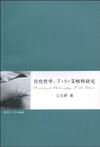诗化哲学
2010-5
复旦大学出版社
江玉娇
356
《诗化哲学:T·S·艾略特研究》主要探讨艾略特(1888-1965)的“秩序理论”,如何从哲学领域转化、运用、实践到其诗学、宗教、文化、社会与创作之中,构成一个密不可分的整体。“秩序理论”是T·s·艾略特众多理论中的一个极其复杂、极其矛盾的核心学说之一,它是理解艾略特的哲学思想、宗教思想、诗学理论和创作活动的重要线索。对各种“秩序”的探讨贯穿了这位“诗人哲学家”的一生:从孩提时候的“神秘幻觉”;“结束小姐与开始先生结婚”;“上先生与下小姐私奔”(Ackroyd22),到年老时的“上升的路就是下降的路,向前的路就是向后的路”;“开始就是结束,结束就是开始”(CP“Four Quartets”189,210,221)。但一系列有关秩序理论的正式出现是在艾略特的博士论文《认知与经验:布莱德利的哲学研究》(1911-1916年完成,1964年出版)中,后来完善于他的诗学和戏剧理论中,并在他的创作中得以印证和实践。艾略特的秩序理论既是一种形而上的哲学与宗教的探讨,也是一个诗学和创作的具体实践过程。艾略特一生在“思”与“诗”之间的不断求索中艰难地摸索着,从哲学秩序到诗学秩序,从宗教秩序到伦理道德秩序,从文化秩序到社会秩序,从世俗秩序到非世俗秩序,最终找到了一个包罗万象的“宇宙秩序”。
AcknowledgementsAbstract(Chinese)Chapter One Introduction1.The Importance of the Practicing of Theories2.Eliots Social Position as a Philosopher3.Eliots Philosophical Research Projects4.The Necessity of the Research in Eliots Theory of Order5.A Brief Introduction to this StudyChapter Two Eliots Order from the Philosophical Perspective1.Epistemological Point of View1.1 A Dialogue Between Objectivity and Subjectivity1.1.1 Feeling Connecting Subjectivity with Objectivity1.1.2 Impressions Connecting Subjectivity with Objectivity1.1.3 The Finite Center Connecting Subjectivity with Objectivity1.2 A Dialogue Between“Inner”and“Outer1.3 A Dialogue Between Reality and Ideality1.4 A Dialogue Between Past and Future2.Methodological Point of View2.1 A Dialogue Between Impersonality and Personality2.1.1 A Dialogue Between Eliot and Personality2.1.2 Mind Connecting Personality with Impersonality2.1.3 Collective-Historical Unconscious Connecting Personality with Impersonality2.1.4 A Dialogue Between Eliots Own Personal Emotions and Poetic Experience2.2 A Dialogue Between Rationality and Irrationality2.3 A Dialogue Between Criticism and Aesthetics2.4 A Dialogue Between Classicism and RomanticismChapter Three Eliots Order from the Poetic Perspective1.Linguistic Point of View1.1 A Dialogue Between Concrete Words and Abstract Ideas1.2 A Dialogue Between Words and Meanings2.Psychological Point of View2.1 A Dialogue Between Words and Objects2.2 A Dialogue Between Objects and Sensation2.3 A Dialogue Between Sensibility and IntelligenceChapter Four Eliots Order from the Cultural Perspective1.Religi OUS Point of View1.1 A Dialogue Between Mysticism and Scepticism1.2 A Dialogue Between Philosophy and Religion1.3 A Dialogue Between God and Man1.4 A Dialogue Between Man and Nature1.5 A Dialogue Between Religious Pluralism and Salvation1.6 A Dialogue Between Fire and Soul1.7 A Dialogue Between Birth and Death2.Ethical Point of View2.1 A Dialogue Between Poetry and Wisdom2.2 A Dialogue Between Philosophy and Wisdom2.3 A Dialogue Between Religion and Wisdom3.CulturalPointOfView3.1 A Dialogue Between Tradition and Time3.2 A Dialogue Between Tradition and Language3.3 A Dialogue Between Objectivity and Tradition3.4 A Dialogue Between Literature and Tradition3.5 A Dialogue Between Religion and Culture3.6 A Dialogue Between Culture and TraditionChapter Five Eliots Order from the Sociological Perspective1.A Dialogue Between Individual and Community2.A Dialogue Between Self and the Universe3.A Dialogue Between Religion and Society4.A Dialogue Between Culture and Society5.A Dialogue Between Primitive Rituals and Modem SocietyChapter Six Conclusion1.A Dialogue Between the Rose-Garden and the Garden of Eden2.A Dialogue Between Eliot and Order Works Cited1.T .S. Eliots W0rks Cited2.Eliots Papers Cited3.The Other Writers Works CitedIndex
Eliot frequently speaks of poetry as essentially a game oramusement whose first and foremost function is to give pleasure.Eliot says,“He[the poet]would like to be something of a popular entertainer....He would like to convey the pleasures of poetry,not only to a larger audience,but to larger groups of peoplecollectively….There might,one fancy,be some fulfillment inexciting this communal pleasure....As things are,and as fundamentally mey must always be,poetry is not a career,but a mug’Sgame”(TUP154).
